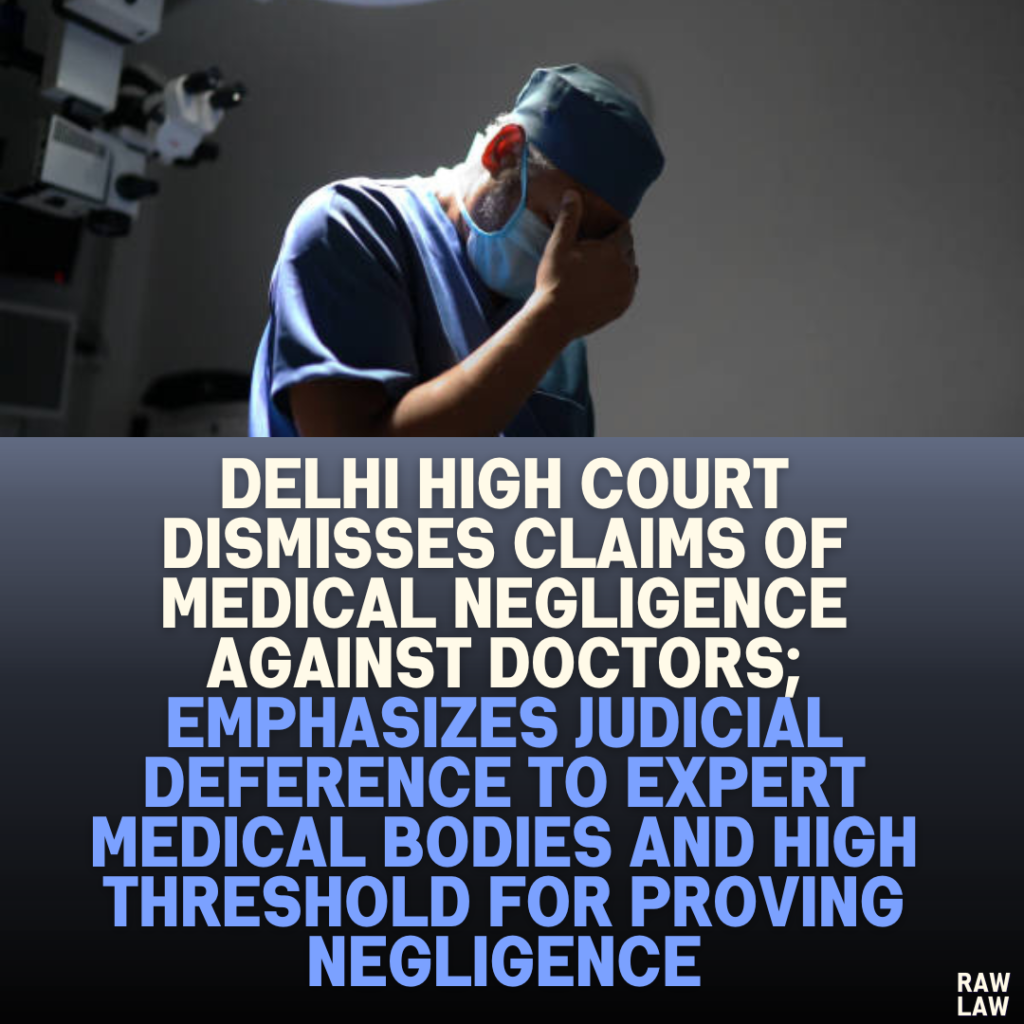Court’s Decision
The Delhi High Court dismissed the petitioner’s claims of medical negligence and professional misconduct against the respondent doctors and upheld the findings of the Delhi Medical Council (DMC) and the National Medical Commission (NMC). The Court held that judicial interference in decisions of expert medical bodies is unwarranted unless their findings are arbitrary, perverse, or illegal.
Facts
The petitioner’s wife suffered from multiple medical conditions, including Systemic Lupus Erythematosus, hematemesis, and respiratory distress, requiring urgent medical attention. She was initially treated at a government hospital but was transferred to Max Hospital, Patparganj, after being denied ventilator support due to a lack of ICU facilities.
At Max Hospital:
- She was admitted under emergency care but not immediately assigned an ICU bed due to non-availability.
- Delays in diagnostic tests and treatment were alleged, including delayed MRI scans and chest X-rays.
- She was administered FENTANYL, an opioid analgesic, in what the petitioner claimed was excessive dosage without proper consent.
- After suffering a cardiac arrest and further complications, she was discharged under Leave Against Medical Advice (LAMA) at the petitioner’s request.
- She died at home a few hours later.
The petitioner filed complaints with the DMC and subsequently appealed to the NMC, alleging professional negligence and procedural lapses. Dissatisfied with the findings, he approached the High Court under Article 226 of the Constitution.
Issues
- Whether there was evidence of medical negligence or misconduct by the respondent doctors.
- Whether the procedural conduct of the DMC and NMC was arbitrary or irregular.
- Whether the petitioner’s grievances about ICU allocation, delayed tests, drug administration, and senior oversight constituted negligence.
Petitioner’s Arguments
- Negligence in Care: Alleged failure to provide timely medical care, including ICU allocation and critical diagnostic tests.
- Drug Administration: Claimed that FENTANYL was administered in excessive doses without consent, causing deterioration.
- Procedural Lapses: Argued that the DMC failed to summon key doctors, particularly Dr. Rinkay Ahuja, for examination.
- Senior Oversight: Alleged the absence of senior doctors contributed to inadequate care and ultimately caused his wife’s death.
Respondents’ Arguments
- Adherence to Protocols: Asserted that all medical interventions were appropriate given the patient’s unstable condition.
- Dynamic ICU Allocation: Explained that ICU availability is fluid, and the patient received life-saving interventions in the emergency room.
- Drug Dosage Justification: Argued that the dosage of FENTANYL was medically justified based on her condition and weight.
- Procedural Rectification: Noted that any deficiencies in the DMC’s initial proceedings were rectified during the NMC appellate review.
Analysis of the Law
The Court referenced established legal principles for determining medical negligence:
- Bolam Test: A doctor is not negligent if they act in accordance with a practice accepted by a reasonable body of medical professionals, even if another body disagrees.
- Judicial Deference: Courts should not substitute their judgment for that of expert medical bodies unless there is clear arbitrariness, perversity, or procedural irregularity.
- Burden of Proof: The petitioner must prove that the respondent doctors’ actions fell below the standard of care expected in their field.
Precedent Analysis
- Bolam v. Friern Hospital Management Committee: Established the threshold for medical negligence based on professional standards.
- Kusum Sharma v. Batra Hospital: Reinforced that mere dissatisfaction with treatment outcomes does not constitute negligence.
- Mohammad Minhaj Mustaqueem v. Ethics and Medical Registration Board: Limited judicial review in cases decided by expert medical bodies.
Court’s Reasoning
1. ICU Availability and Emergency Care
The Court accepted that ICU allocation is dynamic and not guaranteed despite prior assurance. It found no evidence that the absence of an ICU bed compromised the quality of care. The emergency room provided necessary interventions, including ventilator support and resuscitation.
2. Drug Administration
The Court deferred to the expertise of medical professionals regarding FENTANYL dosage. It noted that the NMC conducted a peer review and found no deviation from medical standards. The petitioner’s claims of negligence were not supported by evidence.
3. Delayed Tests and Treatment
Medical records indicated regular assessments and interventions. The Court found that treatment delays were due to clinical prioritization rather than negligence. The petitioner’s refusal to consent to certain tests, such as the MRI, contributed to the delays.
4. Senior Oversight
The DMC acknowledged lapses in referring the case to senior doctors promptly and directed remedial measures, including training and improved protocols. The NMC’s findings absolved the respondent doctors of individual culpability.
5. Procedural Lapses by the DMC
The Court noted that any procedural deficiencies during the DMC’s inquiry were rectified during the NMC appellate review. This ensured a comprehensive examination of the petitioner’s grievances.
6. False Affidavit Allegation
The Court dismissed claims of perjury against a respondent doctor, attributing timing discrepancies in statements to human error rather than malintent.
7. Discharge Against Medical Advice (LAMA)
The Court found no evidence that the hospital coerced the petitioner into discharging his wife. The discharge slip explicitly recorded the petitioner’s decision to take her home despite the risks.
Conclusion
The Court upheld the DMC and NMC findings, affirming the adequacy of care provided by the respondent doctors. It emphasized the importance of judicial deference to expert medical bodies and dismissed the petition for lack of evidence of negligence.
Implications
This judgment reinforces the principle that courts should respect the autonomy of expert medical bodies and exercise restraint in interfering with their decisions. It also underscores the high evidentiary threshold for establishing medical negligence, emphasizing the need for comprehensive procedural rectitude.
